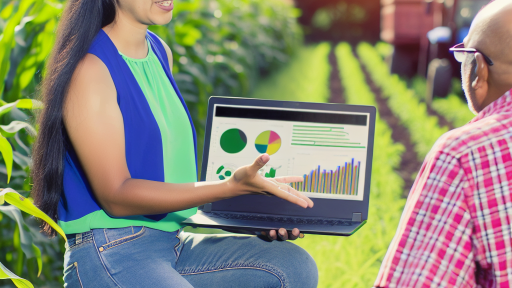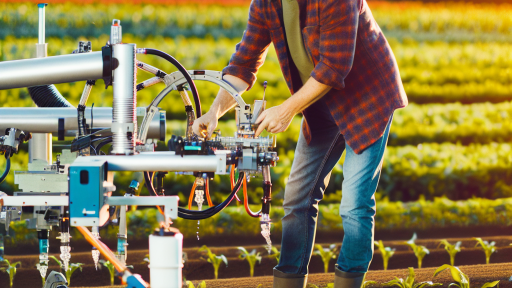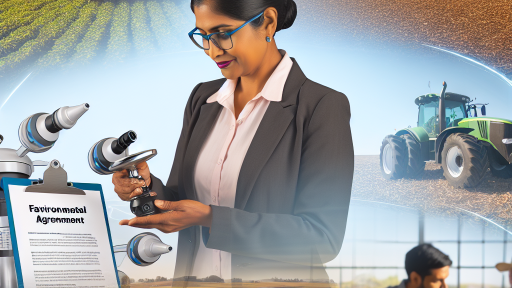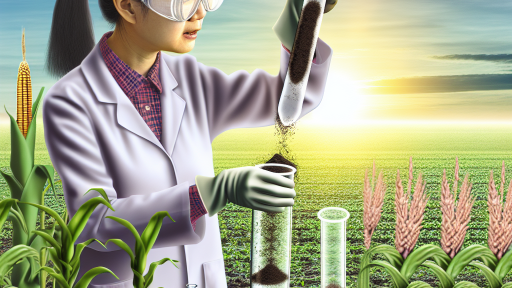The Rise of Artificial Intelligence in Farm Management Software
Transforming Decision-Making Processes
Artificial intelligence significantly enhances decision-making in agriculture.
Farm management software uses AI to analyze vast amounts of data.
This technology empowers farmers to make informed choices quickly.
AI algorithms identify patterns and trends in crop performance.
Consequently, farmers can optimize their planting and harvesting schedules.
Enhancing Resource Management
AI-driven tools improve resource allocation on farms.
Farmers utilize software to monitor and manage water usage effectively.
This technology also tracks fertilizer application for efficiency.
As a result, farmers can reduce waste and lower costs.
Technologies like precision agriculture further enhance these capabilities.
Predictive Analytics for Yield Optimization
Artificial intelligence offers predictive analytics features in software.
These analytics forecast crop yields based on various factors.
Farmers use this data to adjust their strategies proactively.
Weather predictions integrated into software can refine decision-making.
This collaboration helps maximize productivity and minimize risks.
Transform Your Agribusiness
Unlock your farm's potential with expert advice tailored to your needs. Get actionable steps that drive real results.
Get StartedImproving Disease Detection
AI can detect crop diseases and pest outbreaks early.
Farm management software employs image recognition technologies.
Farmers receive timely alerts about potential threats to crops.
With this information, they can take preventive measures promptly.
Such proactive strategies can save substantial losses each season.
Facilitating Precision Farming
AI advancements contribute significantly to precision farming techniques.
Farm management software analyzes soil health and composition.
It recommends specific nutrient applications tailored to soil needs.
This personalization maximizes crop yield while minimizing environmental impact.
Farmers can achieve better outcomes through data-driven practices.
Integration of IoT Devices for Real-Time Data Collection
Enhanced Productivity Through Data Accuracy
Integrating IoT devices can significantly improve productivity on farms.
These devices collect real-time data from various sources across the farm.
Farm managers can utilize this data to make informed decisions quickly.
For example, sensors can provide information about soil moisture levels.
Accessing this data enables farmers to optimize irrigation practices.
This approach leads to more efficient use of water resources.
Improved Crop Monitoring
IoT technology allows for continuous crop monitoring.
Sensors can detect temperature, humidity, and light conditions.
This information helps farmers identify optimal growing conditions.
With this data, they can act on emerging issues before they escalate.
Implementing targeted interventions can lead to higher yields.
Cost Reduction and Resource Management
Data collected via IoT devices can lead to significant cost savings.
For instance, farmers can reduce wastage of fertilizers and pesticides.
By applying these resources only when necessary, they save money.
Showcase Your Farming Business
Publish your professional farming services profile on our blog for a one-time fee of $200 and reach a dedicated audience of farmers and agribusiness owners.
Publish Your ProfileMoreover, real-time data helps in managing labor effectively.
Farm managers can allocate workforce more efficiently based on data insights.
Predictive Analytics for Future Planning
The integration of IoT supports predictive analytics in farming.
Farmers can analyze historical data to forecast future trends.
Using this information, they can plan upcoming planting and harvesting dates.
This capability offers a competitive advantage in agricultural markets.
Farmers can adapt strategies based on projected weather patterns.
Challenges of IoT Integration
Despite its benefits, IoT integration presents challenges.
High initial setup costs can deter some farmers from adoption.
Additionally, there are concerns about data security and privacy.
Farmers need to invest in training to effectively use these technologies.
Collaboration among industry stakeholders can help mitigate these issues.
Adoption of Cloud Computing for Enhanced Data Accessibility
Overview of Cloud Computing in Agriculture
The agricultural sector is increasingly embracing cloud computing solutions.
This technology facilitates real-time data access and management.
Farm management software now leverages cloud capabilities effectively.
Farmers can store and analyze vast amounts of data seamlessly.
Moreover, cloud computing enables collaboration among agricultural stakeholders.
Benefits of Cloud-Based Farm Management Systems
Cloud computing offers several advantages for farm management.
First, it enhances data accessibility from any location.
Farmers can monitor crops and livestock remotely.
This accessibility fosters quicker decision-making processes.
Second, cloud solutions improve data security and backup processes.
Storing data in the cloud reduces risks of data loss.
Additionally, farmers benefit from lower infrastructure costs.
Cloud services eliminate the need for extensive physical servers.
Future Developments in Cloud Technology
Future trends indicate even greater integration of cloud technologies.
We can expect enhanced analytics capabilities in farm management tools.
Advanced algorithms will help predict weather patterns and crop yields.
Furthermore, the internet of things (IoT) will significantly influence this landscape.
IoT devices will collect real-time data and relay it to cloud platforms.
This development will enable farmers to optimize productivity efficiently.
Challenges to Consider
Despite the advantages, challenges remain in adopting cloud solutions.
Some farmers may face connectivity issues in rural areas.
Data privacy concerns also arise with cloud computing.
It is essential to choose reputable cloud service providers.
Investing in training further enhances effective use of cloud technologies.
Gain More Insights: Using Remote Sensing to Detect Crop Diseases
Utilization of Big Data Analytics for Predictive Farming
Introduction to Big Data in Agriculture
Big data plays a crucial role in modern agriculture.
This technology enables farmers to collect vast amounts of data.
Farmers can analyze this data to make informed decisions.
Showcase Your Farming Business
Publish your professional farming services profile on our blog for a one-time fee of $200 and reach a dedicated audience of farmers and agribusiness owners.
Publish Your ProfileConsequently, they optimize yields and minimize risks.
Benefits of Predictive Analytics
Predictive analytics enhances decision-making in farming.
Farmers can forecast weather patterns more accurately.
This analysis identifies optimal planting and harvesting times.
Moreover, it helps manage resources efficiently.
Types of Data Utilized
A variety of data sources contribute to big data analytics.
These include weather data, soil health metrics, and crop performance.
Farmers also use market trends and consumer behavior data.
All these insights drive better agricultural practices.
Real-World Applications
Several farms successfully implement big data analytics today.
For example, Green Fields Farms uses predictive tools for crop management.
They analyze real-time data to improve yield predictions.
This approach has significantly increased their profitability.
Challenges in Implementation
Despite its benefits, many farmers face challenges adopting this technology.
Data management and analysis can be overwhelming for some.
Additionally, technology costs may deter smaller operations.
However, investing in training can alleviate these concerns.
Future Trends
The future of farm management software looks promising.
We can expect more accessible tools for smaller farmers.
Furthermore, AI integration will enhance data analysis processes.
Ultimately, these advancements will drive sustainable farming practices.
Delve into the Subject: Automated Machinery Safety Practices For Farmers
Development of Mobile Applications for On-the-Go Farm Management
Increase in Mobile Usage in Agriculture
Farmers are increasingly relying on mobile devices for daily operations.
This trend reflects the growing need for real-time data access.
Additionally, mobile applications help streamline farm management tasks.
Farmers can now manage their operations directly from their smartphones.
Benefits of Mobile Applications
Mobile applications enhance decision-making capabilities for farmers.
They provide instant access to important data such as weather forecasts.
Furthermore, these apps facilitate communication among team members.
Farmers can monitor equipment and crops from anywhere on the farm.
Features of Modern Farm Management Apps
Many apps incorporate GPS technology for precision farming.
This allows for better field mapping and resource allocation.
Data analytics features help farmers optimize their operations.
Users can track crop yields and analyze production trends.
The Role of Cloud Technology
Cloud technology enhances the functionality of mobile applications.
It allows for seamless data synchronization across devices.
Moreover, cloud storage provides a secure environment for sensitive information.
Farmers can access their data from multiple devices with ease.
Future Trends in Mobile Farm Management
Artificial intelligence is set to play a significant role in new applications.
AI can analyze data to offer actionable insights to farmers.
Showcase Your Farming Business
Publish your professional farming services profile on our blog for a one-time fee of $200 and reach a dedicated audience of farmers and agribusiness owners.
Publish Your ProfileMoreover, integration with IoT devices will become increasingly common.
These advancements will further enhance efficiency and productivity.
You Might Also Like: Data-Enhanced Decision Making for Farmers

Increased Emphasis on Data Security and Privacy Measures
Growing Threat Landscape
The landscape of cybersecurity threats continues to evolve rapidly.
Farm management software faces new challenges every day.
As a result, protecting sensitive data has become more critical than ever.
Regulatory Compliance
Farm management companies must adhere to stringent regulations.
GDPR and CCPA set high standards for data protection.
Non-compliance can lead to severe penalties for businesses.
Enhanced Security Protocols
Developers are implementing advanced encryption methods for data protection.
Multi-factor authentication is becoming a standard practice.
These measures add layers of security to sensitive information.
User Education and Training
Educating users about data security is essential.
Training programs can help employees recognize potential threats.
A well-informed team can act quickly to mitigate risks.
Impact of Emerging Technologies
Blockchain technology offers promising solutions for data security.
Its decentralized nature enhances transparency and trust.
Moreover, artificial intelligence can aid in identifying vulnerabilities.
Future Trends in Privacy Practices
Privacy by design will guide future software development practices.
Companies will prioritize user privacy from the initial design phase.
This proactive approach will help build customer trust.
Delve into the Subject: Cost Savings with Automated Farming Equipment
Exploration of Blockchain Technology for Transparent Supply Chains
Understanding Blockchain in Agriculture
Blockchain technology revolutionizes data management in the agricultural sector.
It provides a decentralized ledger that enhances security and transparency.
Farmers can track their products from production to consumption.
Additionally, all parties involved can verify the product’s origin easily.
Benefits of Blockchain for Supply Chain Transparency
Implementing blockchain improves traceability throughout the supply chain.
It eliminates discrepancies by recording each transaction in real-time.
This leads to increased trust between farmers, suppliers, and consumers.
Moreover, it enables accurate reporting of agricultural practices.
Transparency can also enhance food safety by quickly identifying contamination sources.
Challenges to Adoption
Despite its benefits, blockchain faces several adoption challenges.
High technology costs can deter small farmers from implementation.
Additionally, the need for robust internet connectivity limits accessibility.
Lack of understanding of blockchain technology also hampers its uptake.
Education and training are essential to overcome these barriers.
Future Adoption Trends
Looking ahead, more agricultural stakeholders will embrace blockchain technology.
Collaborative platforms are likely to emerge, driving collective benefits.
Furthermore, innovation in smart contracts will simplify transactions.
As awareness grows, regulatory frameworks will likely develop alongside.
Showcase Your Farming Business
Publish your professional farming services profile on our blog for a one-time fee of $200 and reach a dedicated audience of farmers and agribusiness owners.
Publish Your ProfileUltimately, these trends will enhance the efficiency of agricultural supply chains.
Sustainability Features in Farm Management Software
Promoting Eco-Friendly Practices
Farm management software plays a crucial role in promoting sustainability.
These tools help farmers adopt eco-friendly practices effectively.
Moreover, they provide insights into resource management and crop management.
Monitoring Environmental Impact
Advanced software solutions track the environmental impact of farming operations.
They measure soil health, water usage, and carbon footprint regularly.
This data allows farmers to make informed decisions.
As a result, they can reduce their environmental footprint over time.
Data-Driven Decision Making
Farm management software offers data analytics features.
Farmers can analyze crop performance and inputs efficiently.
Additionally, they identify trends and predict outcomes based on historical data.
This information helps in optimizing resource use and improving yields.
Integrated Sustainability Practices
Many software solutions integrate practices like crop rotation and cover cropping.
These practices enhance soil health and biodiversity on farms.
Through integration, farmers can plan accordingly and adjust practices easily.
Compliance with Environmental Regulations
Farm management software assists in maintaining compliance with sustainability regulations.
It keeps records of environmental practices for audits.
This compliance reduces the risk of penalties and promotes trust with consumers.
Education and Awareness
These software platforms often include educational resources.
Farmers gain insights into sustainable practices directly from the software.
Furthermore, sharing success stories fosters a community of eco-conscious farmers.
Such awareness efforts drive broader acceptance of sustainable farming techniques.
Additional Resources
U.S. Soybean Production Expands Since 2002 as Farmers Adopt …




